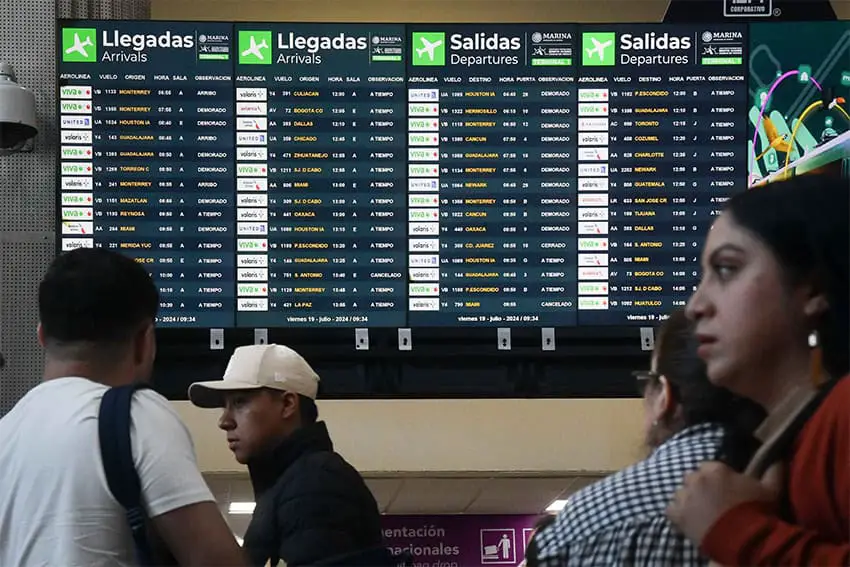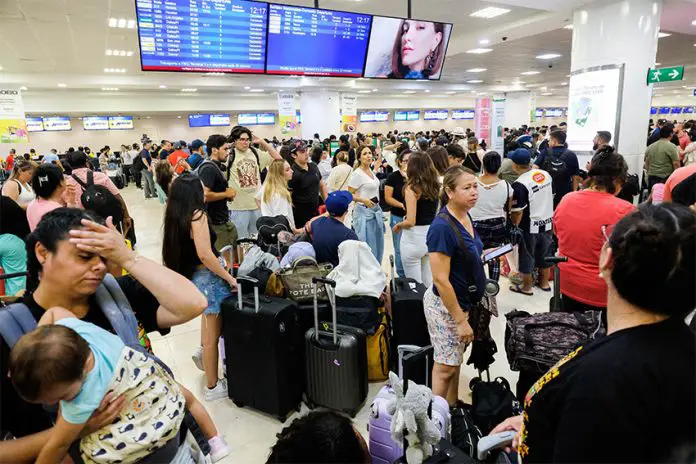Chaos at airports and long lines of cars and people at the northern border were among the problems Mexico faced on Friday due to an IT meltdown that affected Microsoft Windows computers in countries around the world.
Scores of flights to and from Mexican airports were canceled and people endured lengthy wait times to enter the United States via crossings on the northern border.
The cause of the trouble? A flawed software update sent out over the internet by Austin-based cybersecurity company CrowdStrike.
What went wrong?
CrowdStrike, which makes cybersecurity software used by multinational companies, government departments and many other organizations, sent out a flawed update on Thursday that caused computers running on Microsoft Windows software to crash.
“When CrowdStrike’s faulty update reached computers running Microsoft Windows, it caused the machines to shut down and then endlessly reboot,” The New York Times reported.

“Workers around the world were greeted with what is known as the ‘blue screen of death’ on their computers. Insufficient testing at CrowdStrike was a likely source of the problem, experts said.”
George Kurtz, the president and CEO of CrowdStrike, said on X that, “this is not a security incident or cyberattack.”
“The issue has been identified, isolated and a fix has been deployed,” he wrote.
Mikko Hypponen, the chief research officer at cybersecurity company WithSecure, said the outage was “historic,” asserting that “we haven’t had an incident like this” before.

Impacts from the outage were expected to persist over the weekend.
Tech troubles trigger chaos in Mexican airports
Low-cost Mexican airline Viva Aerobus canceled all its international flights on Friday. Other carriers including Aeroméxico and Volaris also canceled some flights to or from Mexico due to their inability to access their IT systems.
“This global outage is mainly impacting our flights with an origin or destination outside Mexico, preventing us from carrying out the documentation [of passengers],” Viva Aerobus said in a statement, adding that European, Asian, Australian and U.S. airlines were facing the same problem.
The airline published a list of 65 canceled international and domestic flights. They included flights from Mexican airports to destinations in the United States, Colombia and Cuba, and flights into Mexico from those countries.
International and/or domestic flights to and/or from the Mexico City International Airport (AICM), the Guadalajara Airport, the Cancún Airport, the Morelia Airport, the Querétaro Airport, the Monterrey Airport, the Mérida Airport, the Guanajuato Airport, the Puerto Escondido Airport, the Hermosillo Airport and the Los Cabos Airport were canceled.

Volaris reported the cancelation of 16 international flights to destinations in Mexico, the United States and Costa Rica.
At AICM — Mexico’s busiest aiport — hundreds of flights were delayed and passengers reported that boarding passes were being filled out by hand. There were long lines at airline counters as employees attempted to overcome the Microsoft outage as best as they could.
In a post to X, AICM advised people with flights scheduled for Friday to contact their airlines “to find out the status of your flights.”
The Guadalajara Airport noted on X that due to the Microsoft outage, airlines were asking passengers to arrive at the airport well before their flights were due to depart to ensure they had enough time to complete the check-in process.
Videos and photos posted to social media showed long lines in various airports, including those in Guadalajara, Monterrey and Cancún. One passenger called the lines at the Monterrey airport “eternal.”
The Reforma newspaper reported that chaos at the Cancún Airport — Mexico’s second busiest airport — began early Friday morning. The newspaper reported that 24 incoming and outgoing flights operated by Viva Aerobus, United, Spirit, Sun Country, Aeroméxico, Delta and Frontier had been canceled by 11 a.m.
Nobody:
Mexicans during a global internet outage: pic.twitter.com/qgfPUg4qnR— Laura Martínez ™️ (@miblogestublog) July 19, 2024
A video showed passengers in a crowed terminal at the Cancún airport singing the traditional Mexican song Cielito Lindo. The song has some sound advice for passengers whose flights were delayed or canceled: “canta y no llores,” or “sing and don’t cry.”
Bumper-to-bumper bedlam at the border
People attempting to cross into the United States via the San Ysidro Port of Entry between Tijuana and San Diego were among those who faced long wait times on Friday as a result of the Microsoft outage.
The EFE news agency reported that people who are part of the Secure Electronic Network for Travelers Rapid Inspection (SENTRI) program were waiting for three hours or more to enter the U.S. when they normally cross the border in 10-25 minutes.
One border-crosser told EFE that electronic systems are usually used to verify the identity of SENTRI participants crossing into the U.S. However, biometric technology used by Customs and Border Protection (CBP) was out of action and therefore agents had to carry out visual checks to confirm people’s identities.
“Suddenly they couldn’t do any of that,” said Altagracia Campos, referring to biometric eye and fingerprint checks. “It’s crazy.”
Así la fila de autos que buscan cruzar la frontera en #Nogales entre México y Estados Unidos por la garita Mariposa en #Sonora.
Estos hechos ocurren el mismo día en que una falla informática global en sistemas de Microsoft y CrowdStrike provocó diversos problemas en empresas,… pic.twitter.com/4isalTUzGH
— Luis Alberto Medina (@elalbertomedina) July 19, 2024
EFE reported that complaints about long wait times at the San Ysidro crossing began on Thursday night.
The U.S. Department of Homeland Security, of which CBP is part, said on X on Friday morning that it, and the Cybersecurity and Infrastructure Security Agency, were “working with CrowdStrike, Microsoft and our federal, state, local and critical infrastructure partners to fully assess and address system outages.”
CBP said it was “experiencing processing delays due to the global technology outage.”
“… During this time, travelers at air and land ports of entry may experience longer than normal wait times,” the agency said.
Among the other border crossings where motorists faced long delays to enter the United States were those between Ciudad Acuña, Coahuila, and Del Rio, Texas; and Piedras Negras, Coahuila, and Eagle Pass, Texas.
The El Financiero newspaper reported that there were extremely long lines of vehicles at crossings on the Coahuila-Texas border.
App used by migrants in Mexico also reportedly affected by outage
Newsweek reported that the CBP One app, which migrants in Mexico use to make appointments to request asylum in the United States, was affected by the Microsoft outage.
“Waiting times aren’t being displayed in the app, and users are being directed to an error when they attempt to check,” the magazine reported.

“The CBP desktop website also appears to be experiencing technical difficulties following the Microsoft outage,” it added.
CBP said later in the day that all its applications, including CBP One, were operational.
AMLO: outage not affecting government IT systems
At his morning press conference on Friday, President Andrés Manuel López Obrador acknowledged that the Microsoft outage was affecting air travel.
“Domestic flights are departing without too many problems, but the international ones … are being delayed,” he said.
Asked whether federal government IT systems were “protected,” López Obrador responded:
“Yes, we don’t have a problem here.”
With reports from El Universal, Reforma, López-Dóriga Digital, EFE, El Financiero, Newsweek, Valley Central, AP and The New York Times
